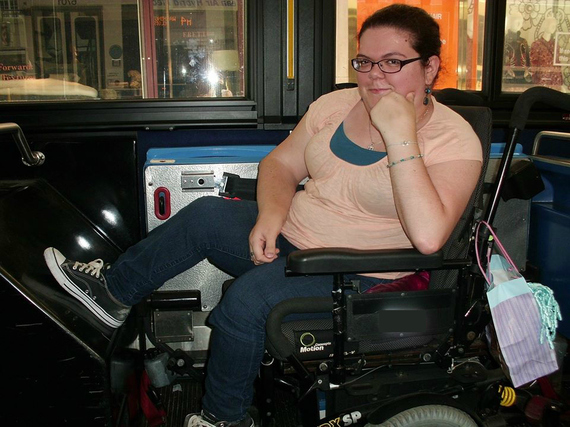
While waiting on the line to order food in Penn Station in New York City, your sweet little boy looked me up and down, his soft blue eyes curiously studying my power wheelchair. He watched as my food was prepared, and noticing I'd ordered the grown-up size meal, he turned to me and declared I was getting a "big burrito." He sidled up to the control box on my wheelchair, pointing to the joystick and asking matter-of-factly, "What's this?" I explained that I use it to move my chair back and forth, and gave him a quick demonstration. Satisfied with my answer, your little boy went on to ask how I turn my wheelchair on and off, and how I change the speed. It was such a lovely little conversation, and I was glad to have a chance to share that my wheelchair isn't anything that a kid should be afraid of.
But then, you heard your son's questions and you cut him off. You told him "She could run you over!" as you laughed a condescending laugh and pulled him away. It seems you entirely missed the point of what could have been a perfect teachable moment. And it stung.
Parents should be their child's best role model when it comes to how to interact with the diverse world around them, and yet, situations like these happen all too often. I'll pass by families on the street and a parent will yank their child away, as though I'm a threat. (If you're afraid I actually will run your child over, consider this: I won't. I've got just a little bit of experience in my wheelchair.) I'll be rolling through a store and hear a little kid ask innocently what happened to me, prompting the parent to hiss at them for being disrespectful. In a child's eyes, these interactions cause me to become scary and intimidating, someone who should be avoided. This kind of negative reinforcement breeds new generations of stigma against disabled people, and I, for one, am tired of history repeating itself.
Disabled people have long been made to be outsiders. We are rejected, unaccepted, the running punch line of society's jokes. At no time do I feel this more deeply than when strangers who know nothing about me feel that they have the right to comment on my existence. I've heard it all before, from the not-so-funny "do you have a license for that thing?" to the cutting "I'd be miserable if I had to live like you."
And you know why people say things like this to me over and over again? It's because behaviors are learned. Attitudes are learned. Prejudice is learned. But it doesn't have to be this way, and the power is in your hands to spark a change. Every child raised to accept all human beings has the potential to grow up as someone who will work to end the cycle of discrimination.
By allowing children to express their natural curiosities about bodily differences and disabilities and encouraging them to accept and understand, disability becomes just another part of the world instead of something to be feared.
Your child is watching you, Mom and Dad. Who do you want him to be?

